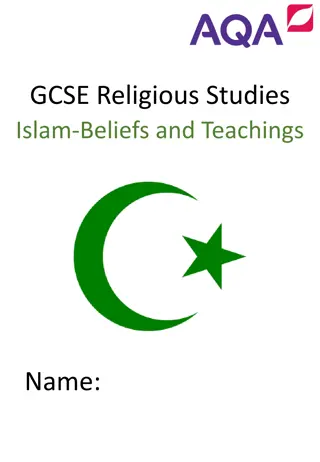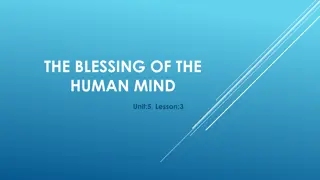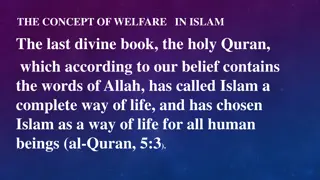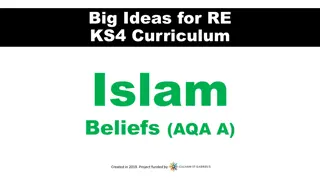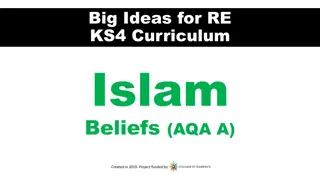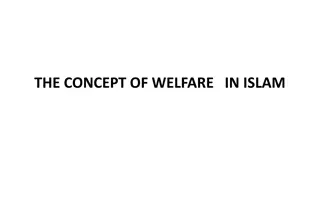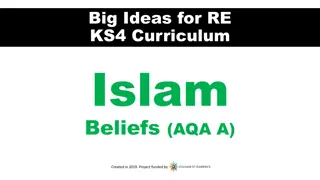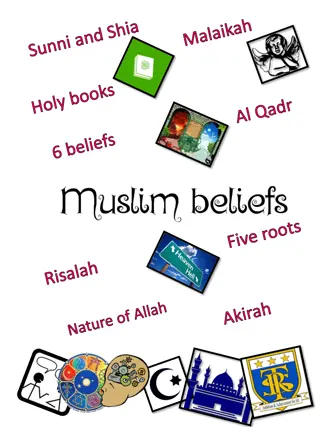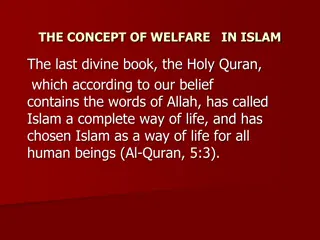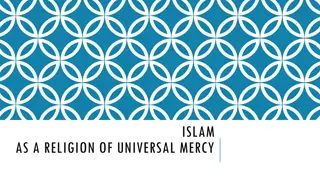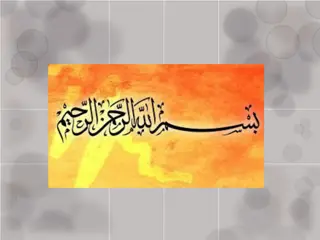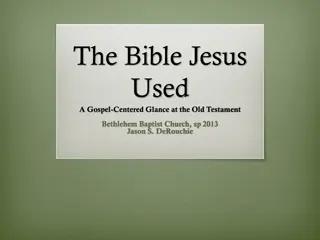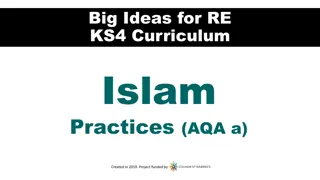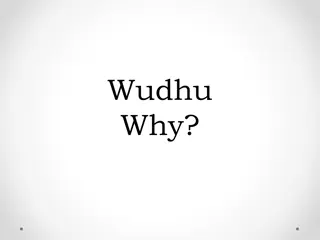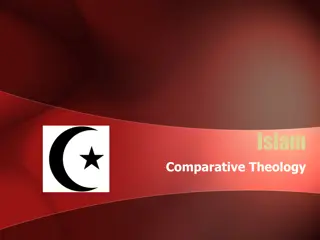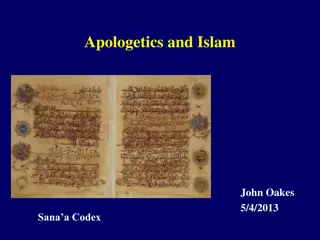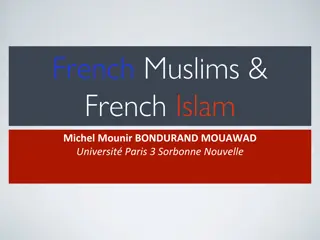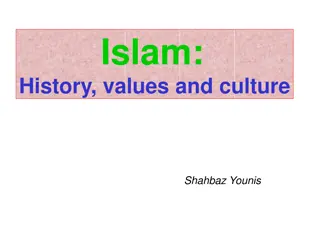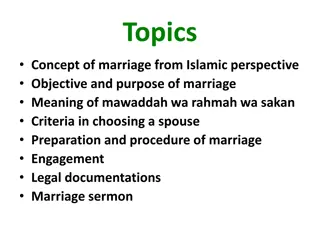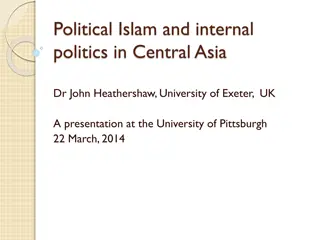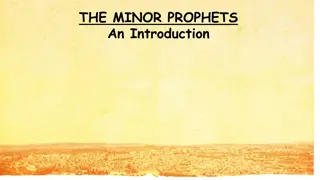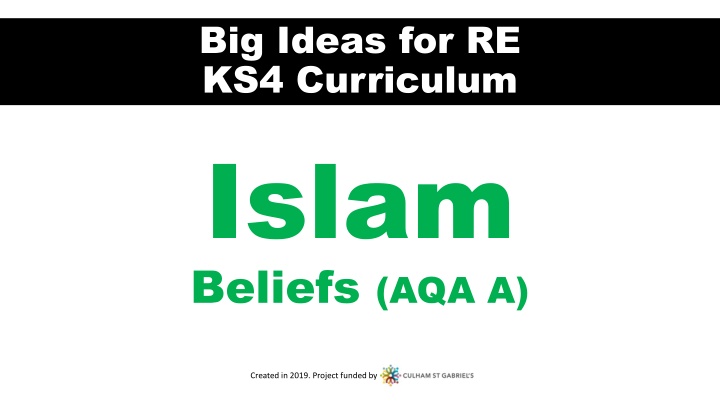
Exploring Islam Beliefs: Key Concepts and Prophets
Delve into the core beliefs of Islam, including the Oneness of God, prophethood, and the nature of God. Learn about key prophets such as Ibrahim, Adam, and Muhammad, and their roles in Islamic faith. Uncover the significance of holy books, the concept of predestination, and the afterlife in Islam.
Download Presentation

Please find below an Image/Link to download the presentation.
The content on the website is provided AS IS for your information and personal use only. It may not be sold, licensed, or shared on other websites without obtaining consent from the author. If you encounter any issues during the download, it is possible that the publisher has removed the file from their server.
You are allowed to download the files provided on this website for personal or commercial use, subject to the condition that they are used lawfully. All files are the property of their respective owners.
The content on the website is provided AS IS for your information and personal use only. It may not be sold, licensed, or shared on other websites without obtaining consent from the author.
E N D
Presentation Transcript
Big Ideas for RE KS4 Curriculum Islam Beliefs (AQA A) Created in 2019. Project funded by
AQA a: ISLAM, BELIEFS AQA a: ISLAM, BELIEFS Authority Prophethood (Risalah) including the role and importance of Adam, Ibrahim and Muhammad. The holy books: Qur an: revelation and authority the Torah, the Psalms, the Gospel, the Scrolls of Abraham and their authority. The imamate in Shi a Islam: its role and significance. Key Beliefs The six articles of faith in Sunni Islam and five roots of Usul ad-Din in Shi a Islam, including key similarities and differences. The Oneness of God (Tawhid), Qur an Surah 112. The nature of God: omnipotence, beneficence, mercy, fairness and justice (Adalat in Shi a Islam), including different ideas about God s relationship with the world: immanence and transcendence. Angels, their nature and role, including Jibril and Mika il. Predestination and human freedom and its relationship to the Day of Judgement. Life after death (Akhirah), human responsibility and accountability, resurrection, heaven and hell.
1: 1: Before Islam (a) prophets Before Islam (a) prophets BIG IDEAS LEARNING CONTEXT: Islam as an Abrahamic faith CONTEXT: timeline: Jewish prophets, Jesus, Muhammad BELIEFS: nature of prophet hood BELIEFS: information about each prophet From the spec (risalah), including the role and importance of Ibrahim, Adam and Muhammad authority; prophethood Learning outcomes: Who are Ibrahim and Adam What is the role of a prophet in Islam? Connection between prophets RESOURCES 1 Ibrahim Adam 1 Prophets
Lesson 1 Show picture of the ka aba. Built by Ibrahim, so the legend goes. Read info on Ibrahim on 1 Ibrahim Adam sheet Mix and match historical and mythical knowledge [slide x 2]. Write notes on the two types of knowledge. Is all the info about Ibrahim mythical? Is there any historical? Find examples of historical and mythical thinking- two given on slide Define prophet [slide]. Discuss what gives prophets authority Cut up and hand out prophets cards using 1 Prophets , complete the table (slide) Learn about Adam, info sheet 1 Ibrahim Adam . Discuss where Hawa fits in- is she a prophet? Do they have to be men? Consolidate how Ibrahim and Adam met the role of a prophet- their authority in islam.
Who, Where, When ,Why, What? Photo by Sulthan Auliya on Unsplash
Also known as mystical knowledge Looking for evidence of bias Stories about gods and heroes which inspire courage WE: Match the types of knowledge Meaning; belonging; hope that things can be better Assessing the validity of conflicting accounts Comparing different evidence to build up understanding Stories which contain a moral lesson Historical Mythical Stories which explain suffering and evil Records of the past which shed light on the present Eyewitness accounts and physical evidence
Historical Knowledge Mythical Knowledge EXAMPLES Samuel Pepys diary describes the Great Fire of London in 1666 God chose Moses to free the Hebrews from slavery in Egypt What happened, why did things happen, dates, people, events, causes. Based on archaeological and written sources. Stories of gods and heroes, accounts of incredible events which give meaning, hope and a sense of belonging. Explanations for suffering and evil.
Risalah (prophethood) Prophets have been sent by God since beginning of creation; every community is sent a messenger (Q. 10: 47) In the Qur an, a prophet: Conveys God s messages to humanity Does not adapt or alter God s message in transmission Lives a perfect life to provide a living role model Receives guidance from God in meeting this standard Leads and guides the community so they can live according to God s wishes Legend has it that 124,000 prophets have been sent. 25 are mentioned by name in the Qur an (21 of whom are in the Bible) Considered of equal importance: We make no distinction between any of them (Q. 2: 136). Some produce divinely inspired books (kutub) TASK: What does it mean to be a Prophet?
Prophets of Islam BIBLICAL NAME ISLAMIC NAME WHAT THEY DID YOU TASK: Explain How Adam and Ibrahim meet the role of a prophet? What is their authority in Islam? 12 mark Q: For Muslims, Adam is a more important Prophet than Ibrahim.

